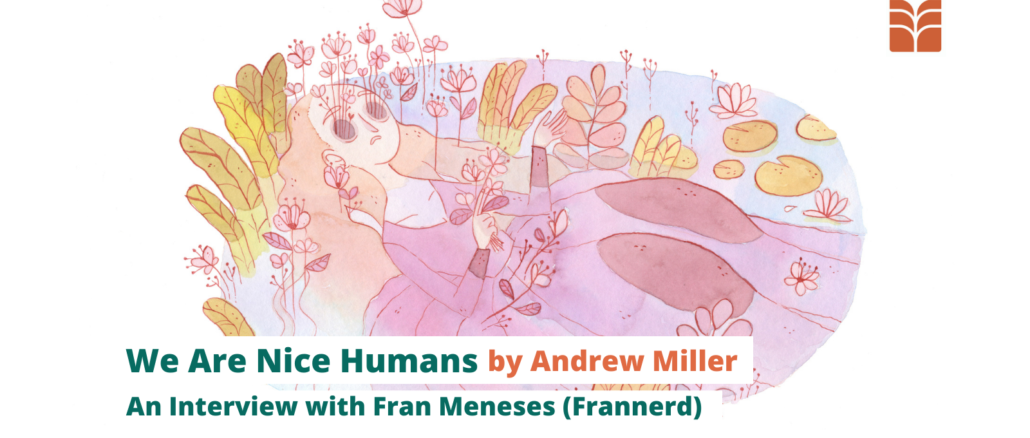
Illustration is a language not held in by borders or history. Chilean artist Fran Meneses embodies this spirit personally as well as professionally through the work she’s been creating over the past decade; all the while drawing in a global audience who appreciate what her art has to say about the world we live in today.
Meneses uses the moniker Frannerd for her signature and social media accounts that have allowed her to flourish in otherwise difficult financial times, particularly for artists.
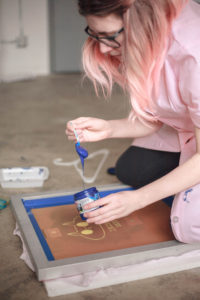
“I always saw comics, illustration, and graphic novels as something you did on the side; because, in Chile I didn’t know anyone who did this for a living,” Meneses said during our interview. “So, I enrolled in Graphic Design at Universidad Diego Portales in Santiago. I thought it was a good mix of drawing and creativity. But by 2009 I started seeing more and more people doing illustration online and I wanted to do that too.”
At university, Meneses continued making small comic illustrations, honing her craft for capturing everyday life while still assuming that this would be something she could do for fun while earning a living as a graphic designer for a publisher or agency. Eventually, she began taking on small commissions from friends, which lead to an opportunity to create illustrations for the free paper at university.
“There was a Latina feminist blog that was written by women-for-women, and I really liked it, but they used crappy stock photos and such. I was a huge fan of the site and I wanted to make it better, so I pitched myself to them and they took me on,” Meneses said. “Doing these illustrations meant that I had to learn and develop my style. Even though I wasn’t getting paid, that started attracting more attention to my personal blog. Eventually people started asking me to do small paid work for them as well.
“I was trying to be realistic about this working out as a way to make a living in Chile and didn’t really believe it could.”
In 2013 Meneses and her then husband, musician and playwright Eduardo Pavez Goye, moved to Berlin Germany.
“I like the autobiographical approach to peoples work, that’s what I am interested in. I had trouble finding Chilean inspirations of this, which was disappointing,” Meneses said. “I was really influenced by women illustrators from Europe. I have a hard time putting words to my visual style because I don’t think it has a specific name. Conceptually, I think my work comes from a deep state of vulnerability and stripping myself to show my experiences and my thoughts and emotions. I think my duty as an artist is to get as personal and dig as deep as I can when I publish something.”
This vulnerability is displayed in all of Meneses work, though no more so than through her first full length graphic novel Personas Favoritas [2017 SM Ediciones, Chile], coauthored with Pavez Goye, which tackles the difficulties of adult friendships and how those friendships sometimes falter.
“I had a terrible friend breakup as an adult, and I noticed how many other friends of mine were struggling similarly. That was when I realized there weren’t really any books for adults about friendship type relationships. I wanted to discuss how hard it is to make friends as an adult, and what I realized after interviewing therapists and friends around the world, we as adults carry so much emotional baggage,” Meneses said. “So it comes back to being vulnerable. This was a very enlightening process for me.”
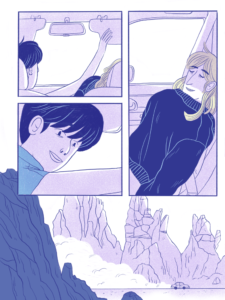
The couple created a podcast for some of these interviews and to work through their own thoughts around this issue while putting the book together. This multidisciplinary approach to her art has allowed Meneses to continue growing creatively, experimenting with different ideas in various public ways and putting that back into her work. Besides the podcast, Meneses has a significant following on YouTube, Instagram, and now through Patreon.
“Ultimately, living abroad and having the internet has allowed me to open an online store, and start to use things like Patreon that I couldn’t do in Chile due to the postal system being unreliable and other issues there. By expanding my income through the internet, it has given me the freedom to turn down client work and just do the work I want to do,” Meneses said. “Not only that, but also, when I moved to Berlin, I felt very lonely and had a hard time connecting with artist scene because of the language barrier. The internet let me connect with people going through that same feeling of inadequacy and sense of wanting to belong. This was a really difficult time for me, but also it helped me to find a sense of purpose.”
From Berlin, the couple moved to London, England, and then down to the coast in Hastings, which is where Meneses was finally able to really support herself on her art alone.
“I think I’m more proud of my identity as a Chilean artist after moving around the world. It is very hard for someone to thrive as an artist in Chile, and I was afraid of how having an accent would cause me problems outside of Chile. I grew up with a lot of shame around my work and self because Chile is so far away and is very isolated,” Meneses said. “My upbringing was so different from a lot of people that I’ve met through all of this moving, and that helps make me recognize what I have been through. Additionally, there is so much resilience you build up from moving. Now it is the moving so much that has become the issue, not the cultural differences.
“When I go to Chile it is familiar, but it isn’t my home anymore. It is like the Theodor Adorno quote: ‘for a man who no longer has a homeland, writing becomes a place to live.’ Instead of writing though, my home is my illustrations. Having been through all of this moving I’m proud to be Chilean and I can see my accent is endearing to others not a failure.”
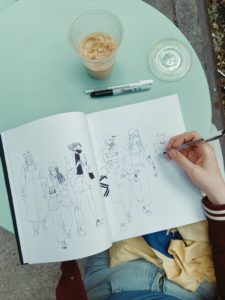
After Pavez Goye was accepted into Columbia University’s Ph.D. Program, the couple moved once again; settling in Brooklyn, New York.
“I have since taken on a bit more of an American style. Part of what I do and what I love about the stuff I’m doing is the mix of something funny, weird and nerdy,” Meneses said. “In both cases, Europe and America, what I love is how simple yet expressive they are with their illustrations, and how they were talking about their own lives in their work. I wanted to make people feel similarly when they saw my work. I like how unapologetic the work is about making mistakes and talking about mental health and pain and depression.”
According to Meneses, author of Daring Greatly, Brené Brown, was another inspiration in this regard.
“I remember how reading these stories [in Daring Greatly] and investigations of shame and vulnerability was what connected me to the artists and musicians that I like. When I started doing my work, I noticed that not a lot of people were doing this with content creation at the time,” Meneses said.
Through her many social media accounts, Meneses hosts live drawing sessions with her audience and interacts regularly with her growing fan base, inspiring new illustrators as well as helping to open the door to some difficult conversations about contemporary womanhood, immigration, surviving an ongoing pandemic, and now coming out lesbian as an adult.
“Social media provides instant response and gratification which makes me more impatient about large projects because you have to work for so long and you can’t show people what you’re doing, and that is unnerving,” Meneses said. “As an author and artist, you have to not disappear for too long but still you must have time for long term projects. If you do this work isolated in a cave, then when you return no one knows who you are anymore.
“The model of artistry where you just come out from a cabin with some piece of work and that supports you doesn’t work anymore because we’re linking the art and the artist so much now. We all want to be part of the process, so as an artist you can’t disappear from the public. It’s interesting how this model has changed, there’s no longer art separate from the artist. Being an artist now is like being a public figure and I think the biggest flaw of some artists is to be indifferent to what’s happening in the world.”
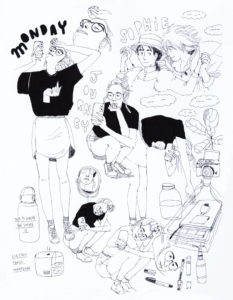
As a Latina, a Chilean, an immigrant, feminist, and lesbian, Meneses has lived life under the patriarchal dictatorship of Pinochet, watched as family members struggle to make ends meet under widening wealth gaps, and recently witnessed the manifestations in her native country that have led to the rewriting of the Chilean constitution. All of these factors play into how she expresses herself.
“I open my chest every time I make some art or content, it is impossible to separate myself and my work. I think with time you gain experience about what you can share and what you shouldn’t share, I think there’s a fine line between being vulnerable and sharing things you shouldn’t,” Meneses said. “I don’t think it is required to share all of your life to be an artist, but we do want to connect and so that means sharing, and that makes you open to criticism. A positive of being open this way though is that it requires me to educate myself about political issues and being informed.”
Interestingly, despite so much struggle, Meneses’ creative endeavors are all the more powerful due to the hope and bravery expressed within them.
“What attracted me to illustration was the power that came from being able to communicate through visual language. I’ve always considered myself not as talented at writing, so I have always been drawn to the visual medium. This is what was captivating to me, and like so many kids, I loved drawing – I just never stopped. I saw people having fun reading my silly comics and so I wanted to keep people feeling that way,” Meneses said. “As I grew up though I realized a lack of representation of women and that was the opening to let me explore the topic in my art. The power of visual art is in how universal it is – people see the picture first and then they understand – they don’t need to spend time processing words.”
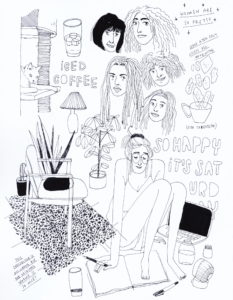
Meneses describes her process as one of people watching at its most basic, but explicitly as a way of capturing the relationship humans have to their surroundings. She expresses this through her Instagram comics which often are derived from internal monologues between her and her cat, her zines tackling issues of self-consciousness, and her travelogues including the full-length graphic novel About to Leave. Recently Meneses has started a project called The Ugly Sketchbook Tour where she shares all of the rough illustrations she has made without self-editing or censorship.
“I’m fascinated by people and the way I process life is through my eyes, through drawing, and part of what I’m doing with my ugly sketchbook is to become more forgiving of my mistakes, to accept my mistakes,” Meneses said. “In that way I think I’m also digesting the things I love about people in a visual way. It’s what helps me make sense of my surroundings.”
Meneses has undertaken yet another graphic novel project with Pavez Goye, who remains a close confidant and creative partner, with the goal of completing it in the next year and finding a publisher to release it shortly thereafter. The new project is based on a science fiction manuscript Pavez Goye wrote, which presented another creative challenge to illustrate technologies, architectures, and landscapes that fall outside of Meneses core comfort zone.
Watching her social media accounts where she posts snippets of this work makes it difficult to believe she is challenged by the project. Following along with her creative process is inspirational. You can follow her creative endeavors at @Frannerd on Instagram, YouTube, and Patreon, or shop her online store at WeAreNiceHumans.com.
FRAN MENESES is a Chilean born artist currently living and working in Brooklyn, NY. Meneses has a large portfolio of work including books, prints, films, and recycled clothing. She has been an artist in residence and guest speaker at several illustration events such as teaching at La Galeria Roja in Sevilla, Spain, and the Society of Illustrators in NYC. She holds a design degree from Universidad Diego Portales in Santiago, Chile.
ANDREW MILLER is an essayist, poet, and photographer whose written work includes two books, one chapbook, and numerous published essays and articles in many different journals and newspapers. His photography has appeared in multiple print publications and displayed in several juried exhibitions. He holds an MFA from Miami University.
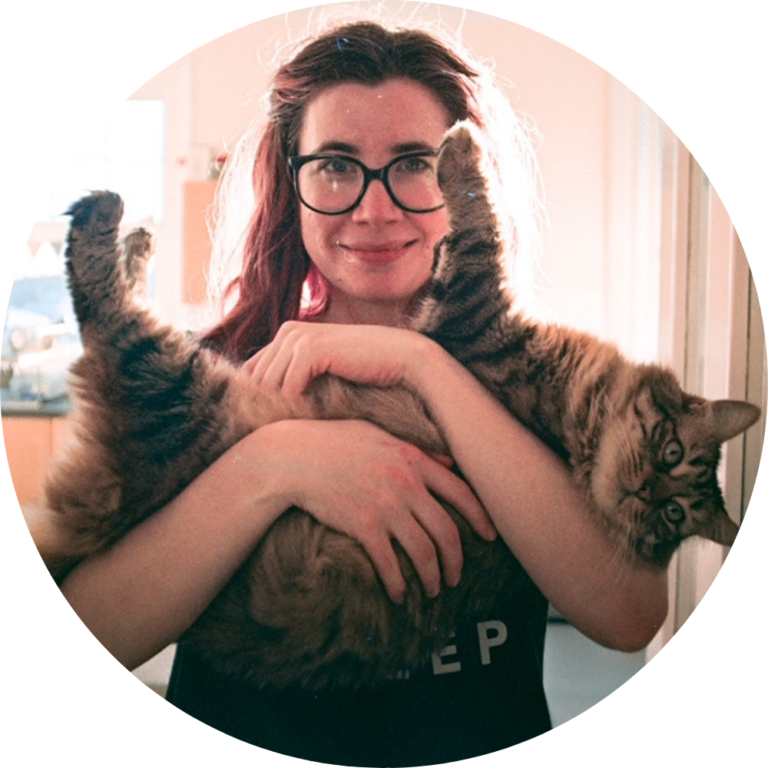
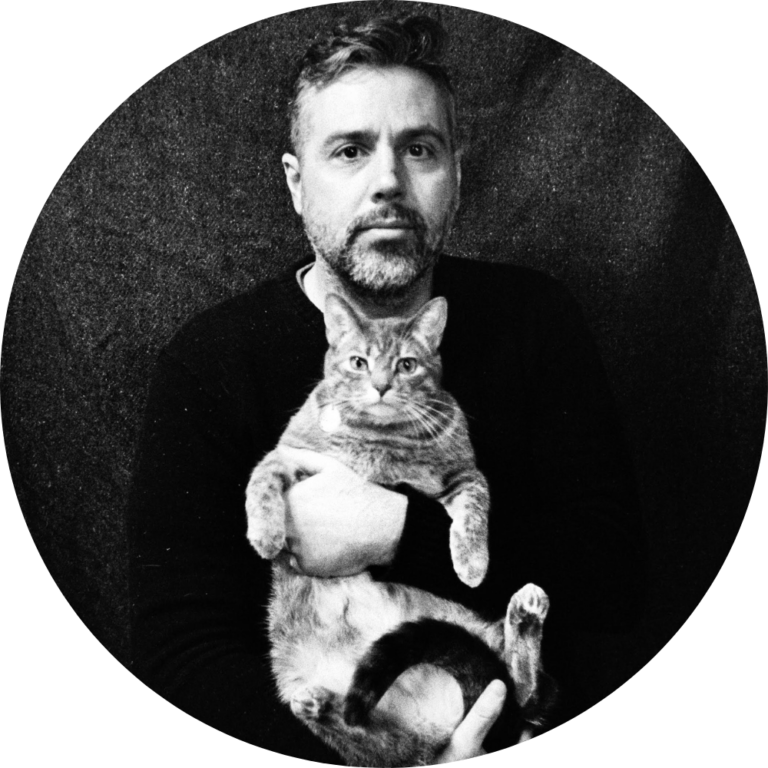
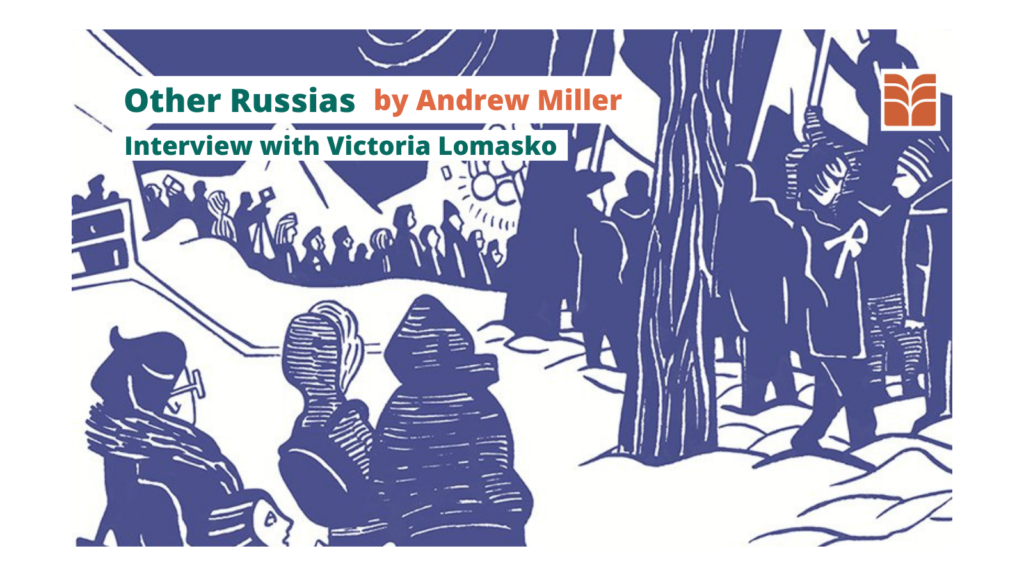
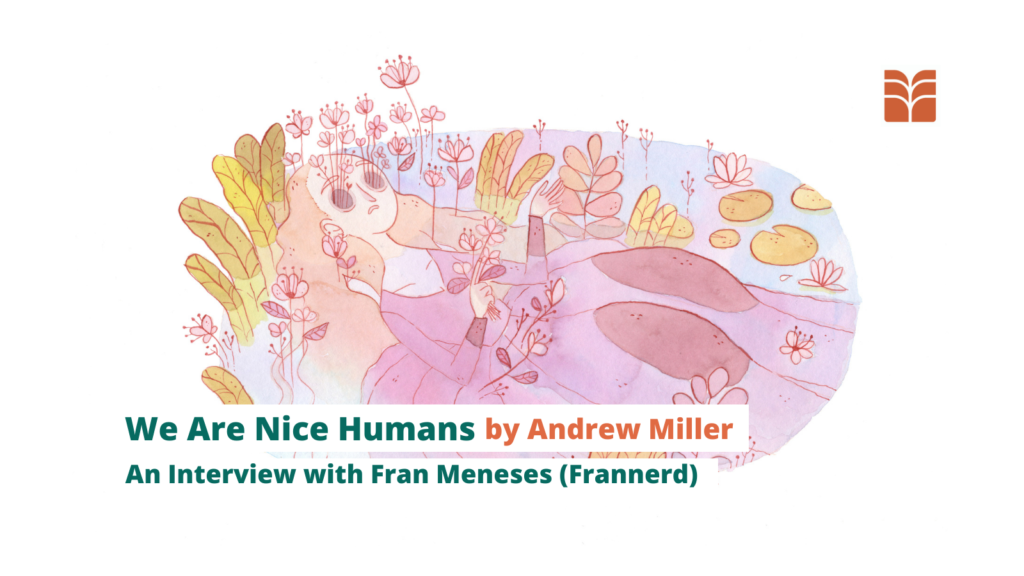
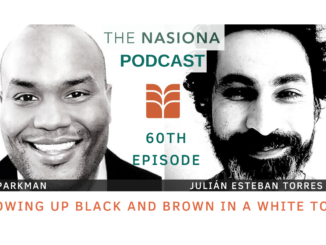
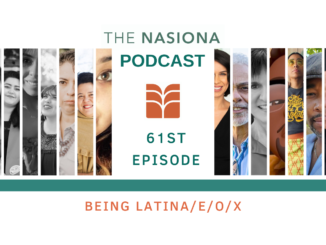
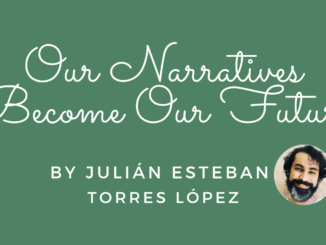
1 Trackback / Pingback
Comments are closed.